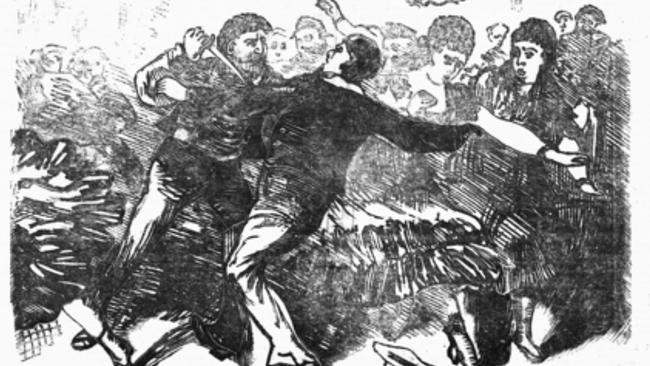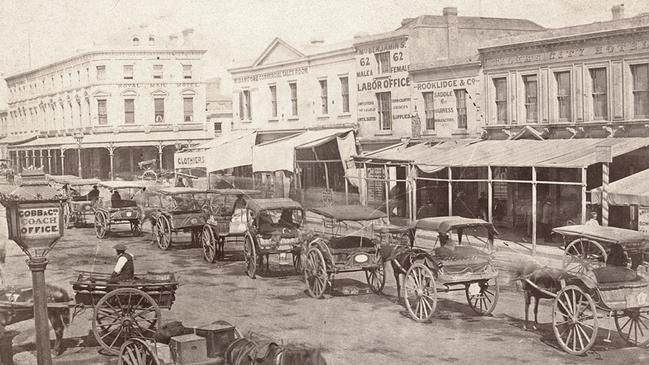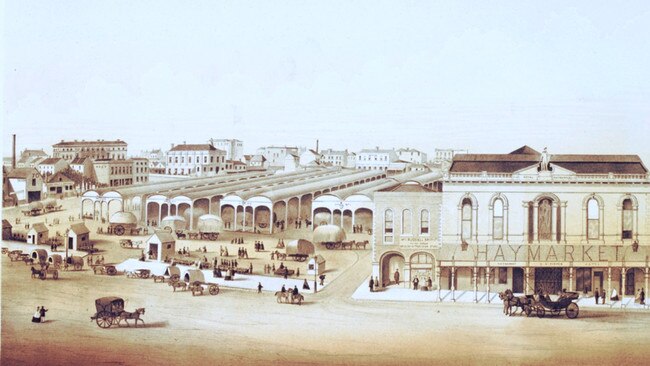The night brutal Bourke St pub stabbing made Quiet Joe a killer
The brutal stabbing of a Bourke St pub patron sparked a murder trial, and a mystery over why a man known as Quiet Joe became a killer.

Our Criminal History
Don't miss out on the headlines from Our Criminal History. Followed categories will be added to My News.
It was past midnight when Sergeant John Fullerton heard trouble at the Whittington Tavern.
He had been keeping watch on the corner of Bourke and Exhibition streets when shouts erupted and drinkers spilled from the pub – the sort of place where bad types would drink in the middle of the night, in the middle of the week.
One of the regulars, a man who went by Dodger Jacobs, was stumbling around holding his mouth.
A waterfall of blood could scarcely be contained by the doomed man’s fingers.
It cascaded onto the cobblestones and, while he still had consciousness, he uttered, “I’ve been murdered.”
A doctor was called for and the victim transported to hospital but he could not be saved.
A tip from a witness led Sgt Fullerton to check the gutter at the front of the pub where he found a knife, about four inches long, covered with blood.
It led to the murder trial of a man known as Quiet Joe, until then a stranger to the tavern, and the mystery about why he stooped to murder.

AN ARGUMENT OVER MONEY
During a hasty coroner’s hearing the day after the violent death in March 1865, one of the witnesses was still drunk in the lockup.
Once he had paid his bail he was subpoenaed straight to the courthouse where, despite the possibility he was still tipsy, he added to the stream of testimony from Whittington Tavern patrons and staff.
The man arrested over the death was Joseph Brown, who was known to some as Quiet Joe.
But the night before, at the Whittington Tavern, he had been anything but quiet.
A rough man in his early forties, who the barman had never seen in the premises before, Joe was insistent he should be bought a drink, rolling up to a group of strangers and asking who was going to shout.
When they refused, he latched on to Emmanuel Jacobs, known in the bar as Dodger. The pair seemed to know each other.
Joe was adamant Dodger should buy him a drink and stalked him around the pub, becoming increasingly agitated.
When he tried to follow Dodger down the hall, the barman intervened.
The two were having an argument about money but at the coronial inquest the landlord was coy about exactly what was said.
Dodger and Joe had recently come into some money – that much was clear.
Speculation arose that they had recently committed a robbery and that Joe was angry about the way the spoils were being divvied up.

He became so angry and quarrelsome that the pair was eventually ejected and wound up out the front of the pub exchanging blows.
When things calmed down, Dodger returned inside with his chums and Joe wandered off into the night.
But that wasn’t the end of it.
After a while Quiet Joe appeared again in the bar, sidling up next to Dodger with his hands in his pockets.
The other men told him to keep things civil and have a drink. There was no reason why everyone shouldn’t be friends.
Eventually Joe called to the bar and things seemed to settle, except for the uneasy air around Joe’s hands, kept firmly in his pockets.
Then it happened.
A hand sprung from Joe’s pocket and struck Dodger once, forcefully, on the jaw.
A hubbub arose as the drinkers and the barman pulled Joe from the tavern and Dodger gripped his face.
Then they saw the blood.
It was coming out of Dodger’s mouth at such a fantastic rate, far more than might be expected from a simple punch to the jaw.
One of the men saw Joe cast something shiny to the gutter.
By the time police arrived, the victim had already lost a lot of blood.
An examination of his corpse later in the night would reveal a tiny hole on the left side of his neck, made with a thrust powerful enough to puncture his jugular, fill his stomach and lungs with blood and kill him within minutes.

QUIET JOE’S LAST WORDS
The coronial inquest the day after the killing found Joe should be tried for murder.
During the trial he insisted he had been totally drunk and didn’t remember committing the stabbing, or why.
He didn’t remember handling the knife and rejected the possibility he had been involved in a robbery that sparked the argument.
But he was found guilty of murder anyway, and sentenced to die by hanging.
Before facing the noose, as he was brought from his cell adjoining the gallows, he admitted there had been a robbery that caused his quarrel with Dodger.
But he insisted he’d only watched Dodger commit the act and had not taken part himself.
He maintained the stabbing had been undertaken in blind drunkenness, but conceded he was responsible.
Trembling and rambling, his final speech to 20 spectators in the gaol went on for minutes before he was hooded by the executioner and sent to the afterlife.
The exact nature of the robbery, how much was stolen and how, went to the grave with the two dead perpetrators.
The standard post-mortem inquest provided little details.
Joseph Brown was 43, born in England, a card sharp and a petty criminal.
One Melbourne newspaper made its verdict the following day: “The murderer and his victim were of that low class who frequent taverns at night for the purpose of disreputable character.”
READ MORE:
THE PARTY BOY WHO BECAME VICTORIA’S POLICE CHIEF
